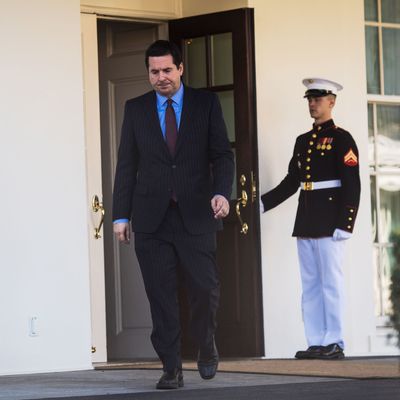
On Monday of last week, James Comey confirmed that the FBI was investigating possible ties between the Trump campaign and Russian interference in the 2016 election.
Two days later, the Republican tasked with leading the House’s investigation into Russian hacking made an announcement: Members of Donald Trump’s transition team had been legally, incidentally surveilled during the final months of the Obama administration.
Devin Nunes revealed this to the public before revealing it to his fellow members of the House Intelligence Committee. He then went to personally brief the president — an ostensible subject of his House investigation — on the intelligence reports that he had just discovered.
This momentarily shifted media attention away from Comey’s revelation and toward the question of whether Trump’s paranoid conviction that he’d been improperly monitored by Barack Obama had some (loose) basis in reality.
It also raised suspicions that Nunes’s announcement was coordinated by the White House to produce this very distraction.
In the days since, those suspicions have largely been confirmed. As The New Yorker’s Ryan Lizza reported this week:
Last Monday morning, shortly before the start of the hearing [where Comey made his revelation], a senior White House official told me, “You’ll see the setting of the predicate. That’s the thing to watch today.” He suggested that I read a piece in The Hill about incidental collection.
… The White House clearly indicated to me that it knew Nunes would highlight this issue. “It’s backdoor surveillance where it’s not just incidental, it’s systematic,” the White House official said. “Watch Nunes today.”
Sure enough, at last Monday’s hearing, Nunes asked in his opening statement, “Were the communications of officials or associates of any campaign subject to any kind of improper surveillance?”
A little over 24 hours after Nunes posed that question, he was spotted on White House grounds. The next day, he suggested that the answer to his query was yes.
Nunes indicated that Trump transition officials had contacted foreign agents who were subjected to legal surveillance, and, thus, had their communications intercepted. By itself, that’s kosher. But when American citizens are swept up by such “incidental” surveillance, their identities are normally masked in intelligence reports, to protect their privacy, unless there is a compelling government interest in “unmasking” them.
Nunes claimed that he had seen intelligence reports in which Trump team members were “unmasked,” for no discernible intelligence purpose.
The House Intelligence Committee chair proceeded to further educate consumers of right-wing media on the dire threat posed by gratuitous unmasking. Meanwhile, Nunes canceled a hearing scheduled for Tuesday, at which former acting attorney general Sally Yates was scheduled to testify about the firing of Michael Flynn — much to the dismay of Trump’s Justice Department. These actions spurred so much partisan rancor within the Intelligence Committee, its investigation ground to halt.
All this made it look an awful lot like Nunes was helping the White House quash an investigation that was headed in a direction that the president didn’t like.
And on Thursday, the New York Times lent further credence to that view:
A pair of White House officials played a role in providing Representative Devin Nunes of California, a Republican and the chairman of the House Intelligence Committee, with the intelligence reports that showed that President Trump and his associates were incidentally swept up in foreign surveillance by American spy agencies
… Several current American officials identified the White House officials as Ezra Cohen-Watnick, the senior director for intelligence at the National Security Council, and Michael Ellis, a lawyer who works on national security issues at the White House Counsel’s Office and formerly worked on the staff of the House Intelligence Committee.
The fact that White House officials leaked the reports to Nunes is less than surprising, given everything we already knew. The more remarkable piece of the Times report may be this:
Officials said the reports consisted primarily of ambassadors and other foreign officials talking about how they were trying to develop contacts within Mr. Trump’s family and inner circle in advance of his inauguration.
Apparently, Nunes’s bombshell revelation may not even be that Trump officials had their communications intercepted — but merely that intelligence reports did not disguise their names, when they were invoked by foreign agents. It is difficult to understand why this is supposed to be outrageous. Wouldn’t there be intelligence value in conversations about a foreign government’s strategy for currying favor with the incoming administration? And wouldn’t revealing the names of the Trump associates mentioned in those conversations be necessary for comprehending them?
Even if the names were unmasked unnecessarily, it’s hard to understand why such a bureaucratic impropriety should take precedence over an investigation into an authoritarian regime’s attempt to undermine American democracy.
Anyhow, the latter investigation appears to be moving forward. The Senate Intelligence Committee held its first public hearing on Russian interference Thursday. And ranking Democrat on the House Intelligence Committee, Adam Schiff, told CNN that he and Nunes have agreed to go forward with a previously scheduled closed hearing with Comey and National Security Agency Director Mike Rogers.
Schiff has also asked Nunes to reschedule an open hearing with Sally Yates. The chairman has not committed to doing so.






























